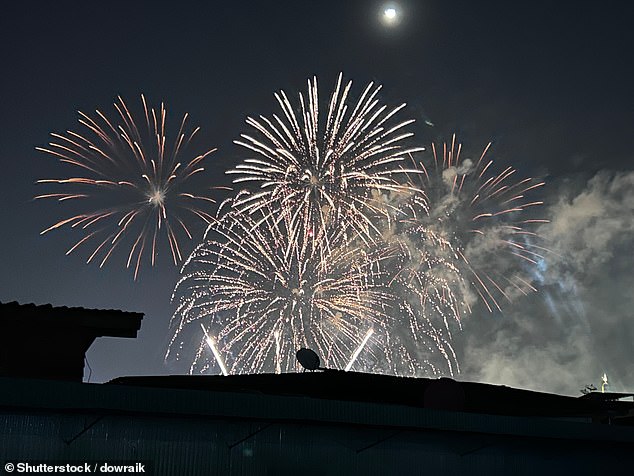It’s September and a nearby neighbor has already put on his first fireworks display as the night progresses.
If last year is anything to go by, we’ll have to regularly endure fireworks coming out of their backyards as they host parties and get-togethers, especially on weekends, until after the New Year.
Fireworks usually start late at night, while my two young children are trying to sleep. We’ve all been kept awake or woken up by them at some point.
Are people still allowed to set off fireworks in their gardens this way?
A neighbour of a This is Money reader has started his usual fireworks party in his back garden.
We do not speak to the neighbours in question and we want to avoid confrontations. How can we ensure that the problem does not get worse as it did last year?
And if this turns into a nightmare again, what can we do and who should we turn to? Will the city council help us?
This is Money’s Jane Denton responds: The start of fireworks displays in people’s gardens seems to start earlier every year.
This is Money has received other emails relating to regular fireworks parties held in back gardens.
Fireworks events can be very disruptive in residential areas, especially if, as in your case, they continue frequently between now and the turn of the year.
The Government website states that it is illegal for anyone to set off fireworks between 11pm and 7am, except on certain occasions.
It adds: ‘Fireworks must not be lit between 11pm and 7am, except on: Bonfire Night when the cut-off time is midnight, New Year’s Eve, Diwali and Chinese New Year when the cut-off time is 1am.’
But for many, 11 p.m. will seem like a late curfew, especially if you have kids and pets.
It’s also worth mentioning that your local council may have its own specific rules about fireworks that can be set off in the area.
I know you don’t talk to your neighbor, but talking to him in person about the problem would be the best place to start.
You should also keep a record of all fireworks events, in case you want your local council to intervene. They may investigate and serve an abatement order if appropriate.

Olivia Egdell-Page is a partner at Joseph A Jones & Co LLP
Olivia Egdell-Page, partner at Joseph A Jones & Co LLP, said: The law states that fireworks, including sparklers, should not be lit or thrown in the street or other public places. If this happens, the incident can be reported to the police.
While fireworks can be used on private property, as I understand is the case here, this is subject to certain parameters.
The general rule is that fireworks should not be set off between 11pm and 7am. There are exceptions for Bonfire Night, when the cut-off is midnight, and for New Year’s Eve, Diwali or Chinese New Year, when the cut-off is 1am.
Some local councils may also impose additional rules or controls on the use of fireworks, so you may wish to contact them in the first instance to better understand the regime in your local area.
In addition, your neighbors’ title deeds may restrict your use of the property if this causes a nuisance.
I would be surprised to see a covenant that specifically addresses fireworks, however, many properties are subject to covenants that prevent the owner from using the property in a way that causes a nuisance or annoyance to neighboring properties.
If you live in a set of properties built in a similar era, it is possible that all the properties are subject to the same or similar covenants. However, to confirm this, you will need to obtain a copy of your neighbour’s title deed from the Land Registry. You may wish to speak to your solicitor to fully understand the covenants imposed before approaching your neighbour on this basis.
My suggestion would be to discuss this with your neighbours in the first instance, as involving a third party would inevitably inflame the situation, if you’ll pardon the pun!
If discussions do not resolve the issue, you may wish to contact the council in the first instance as they may be able to investigate the matter.
If you have an ongoing problem with people setting off fireworks, you can request an antisocial behaviour case review from your local police. This review is usually done online, so it is important that you provide as much information as possible as it will be used in the subsequent investigation.
That said, if you are concerned that someone is in danger as a result of the use of fireworks, call 999 immediately.

Joanne Ellis is a partner at Stephensons law firm
Joanne Ellis, partner at law firm Stephensons, said: While it is not illegal to set off fireworks on your private property, such as a garden, it can often be very disruptive to neighbours, pets and farm animals.
The first step would be to raise your concerns directly with the neighbor and let them know the impact this is having on you and your family.
While these conversations are never pleasant, if handled calmly, they can help ease tensions and prevent the need for further legal action.
If you feel that you cannot approach your neighbour or conversations are not going well, you should speak to local authorities and, if necessary, seek legal advice.
In this case, it may be helpful to keep a detailed record of when the fireworks are set off, how loud they are and how long they last, as well as any video recordings.
Your legal situation will depend largely on the circumstances. Your neighbours’ actions appear to go far beyond an isolated bonfire party and, accordingly, the frequency and recording of events would be key.
If a local authority officer considers that the noise from fireworks constitutes a statutory nuisance (under the Environment Protection Act 1990), they can issue an abatement notice. This is often the quickest and cheapest solution for you.
In addition, under the Noise Act 1996, local authorities in England and Wales have powers to issue a fixed penalty if excessive noise is emitted from premises, including gardens, between 11pm and 7am.
Some local authorities also have a neighbour dispute mediation scheme. If this is available, it may be helpful to set some agreed limits on when fireworks are acceptable.
It is also possible to bring a nuisance claim in the civil courts seeking an injunction to prevent the disturbance from continuing and claiming compensation, which would often be minimal.
The grounds for a successful application depend on a variety of factors and I would suggest you seek specialist legal advice to consider whether litigation, as a last resort, would be helpful, although this can be time consuming and expensive.


